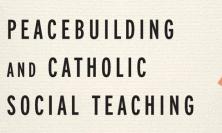With questions of individual freedoms being raised again in light of the renewing of Covid-19 restrictions in the UK, how can the concept of the common good inform public discourse? Sometimes the notion of common good is invoked in favour of civil authorities and the general welfare, sometimes it is employed to protect individual freedoms and human rights. Patrick Riordan SJ argues that the concept of the common good within Catholic Social Teaching combines both aspects since the rights and freedoms of individuals are common goods of our societies. Partisanship for one pole or the other is foreign to the Catholic concern for the whole.
When I began writing about the common good and common goods over thirty years ago the standard objection was to link this notion with authoritarian regimes. Since, it was claimed, the Fascists of Italy and the National Socialists of Germany and the Communists of Soviet Russia had claimed to represent the common good of their respective peoples, it was impossible to use the term without evoking the aura of authoritarianism. However, it was not just a case of risking being condemned by association, of appearing in a similar guise to those rejected forms of political culture; the critics suspected something fundamentally flawed in the language of the common good. Given the great upsurge of interest in human rights in the 1970s and 1980s, the suspected flaw in common good talk was both a neglect of human rights and a willingness to tolerate their violation in the name of public interests. Whoever spoke about political affairs in terms of common goods was tarred by association with the premise attributed to Jean Jacques Rousseau, a significant proponent of the common good, that people could be forced to be free. Whatever the adequacy of this interpretation of the political philosophical thought of the French Republican, the standard interpretation in the English-speaking world attributed to him the view that it would be permissible to force people to accept the conditions of freedom. Isaiah Berlin was a significant contributor to the predominance of this view when he contrasted the notions of positive liberty and negative liberty (Four Essays on Liberty, 1969). The latter he saw as represented by the mainline tradition of English political thought, leading to those freedoms that are formulated in the human rights of freedom from all forms of discrimination. The rights to hold views and express and publish them, and to associate freely with others, without interference from public authorities: these are the kernel of human rights asserted over against the state.
By contrast with negative liberty that secured for individuals their scope for action free from the interference by others, positive liberty stressed the conditions for free action, and pointed to forms of self-mastery ensuring freedom not merely from external interference but from internal drives such as addiction or irrational enthusiasm. To be able to align one’s actions with the demands of reason or with a vision of the self as one would wish to be, is to be free in the positive sense. The problem for Berlin arises when state authorities take on themselves the responsibility for interpreting what reason demands and the vision of self and society that is to be pursued. He doesn’t deny that liberty must be curtailed to some extent in society, ‘since human purposes and activities do not automatically harmonize with one another’ (Four Essays on Liberty, p.124), but there is a limit: ‘a certain minimum area of personal freedom which must on no account be violated’. Those who followed Berlin in the emphasis on the question ‘how far does government interfere with me?’ (p.126) were inevitably concerned about any advocacy in favour of common goods as the purpose of public life and government itself, suspecting the threat of infringement on personal liberties.
In social and cultural life appeals to common goods were also being exposed as essentially oppressive. Feminists were reacting to the pressures on women to place themselves in service of the common good of their families, even if that meant sacrificing their own desires and ambitions. The objection was to the differential in the attitude to women as distinct from men: mothers more so than fathers were expected to sacrifice themselves for their children, wives more so than husbands were expected to put in the work of fostering the relationship. The extreme form of oppression in the name of a common good was identified in the phenomenon of honour-killing: women and girls killed to preserve the honour of a family that they had supposedly violated. Examples of similar moral pressure can be found in other areas of social life, in the workplace, in industrial relations and in the Church. The pressure to avoid conflict, to preserve an apparent harmony, required individuals to relinquish their own concerns or ambitions in the name of a common good that they experienced as oppressive.
It is not surprising, then, that the language of common goods was suspect, and political philosophers in the liberal tradition avoided it completely. In fact, discussion of goods or values in general was avoided, since it was commonly believed that no agreement or consensus in society could be based on a shared view of the human good. The challenge I faced then was to mediate the view of the human good and of common goods as contained in the Catholic intellectual tradition in such a form as to avoid the excesses, but in particular to avoid the unnecessary polarisation of an individual’s human rights and the common good of a society, or indeed of humankind. In line with the Church’s perspective, human rights of individuals are constitutive of the common good.
This challenge remains, but now the pendulum has swung in the other direction and the presupposition in much of the current literature and public debate is that the concepts and principles of the common good are on the side of the critics and resisters, and not a property of the establishment. The hegemony of an economic and political liberalism in our western societies provokes the critique of many who bemoan the lack of shared values, the absence of a sense of communality, and the resultant divisiveness of a society that fosters competitiveness. Those who are critical of the dominant orthodoxy of liberalism, whether economic or political or juridical, invoke the language of the common good to challenge the establishment. Now, instead of appearing to be defensive of the established authorities, the use of common good language appears to situate one on the side of the critics and opponents of the established order.
The former Chief Rabbi, Jonathan Sacks, in his book Morality: Restoring the Common Good in Divided Times (Hodder and Stoughton, 2020) fears that the cultivation of individual liberties has undermined a shared morality. The toxic quality of public debate and the resultant divisiveness is regrettable. He makes the case that there can be no real freedom without morality and without the acceptance of responsibility. The good to be fostered is a common moral foundation for social order. Common good as he invokes it is subversive of the established order, and not defensive.
A similar case is made by a theologian, Jake Meador: In Search of the Common Good: Christian Fidelity in a Fractured World (2019). His title reflects the same regret that the dominant culture of liberalism has led to a polarised and hateful public discourse, a fracturing of society and a widening of differences and inequalities. His recommendation is that the unity of a society depends on a shared story, and that the Christian story can provide a vision for a renewed common life. Here again we find that the common good is invoked in opposition to a dominant narrative.
It is understandable that many of the contributors to this discussion refer to distinctive American experiences. The campaign for the forthcoming presidential election makes us aware of many of these issues, which undoubtedly have their counterparts in Europe and the UK. Robert Reich in his book The Common Good (2018) points to the vicious cycle of deterioration of public culture in the USA and argues that a virtuous cycle is required to restore a shared sense of what really matters. He picks out the need to clarify how honour, shame, patriotism, truth and the meaning of leadership should function in the public culture. This is another example of how the common good of the title is not aligned with the establishment but is invoked to support a project of replacement and reform.
Another recent and relevant contribution by the renowned philosopher, Michael Sandel, The Tyranny of Merit: What’s Become of the Common Good? (Allen Lane, 2020), will be reviewed in a future contribution to Thinking Faith.
This swinging of the pendulum in the location of the common good, sometimes linked spontaneously with the defence of authoritarian regimes, sometimes on the side of those who challenge the dominant orthodoxy, lends plausibility to the case made in another recent book about the American political experience: American Character: A History of the Epic Struggle Between Individual Liberty and the Common Good (Penguin, 2017). The author, Colin Woodard, interprets the history of the country in terms of this polarisation between individualism and collectivism, between individuals’ rights and the good of the community as a whole. This history illustrates the challenge if not the impossibility of finding a sustainable balance between these two standpoints. When in a presidential election campaign one side is accused of socialism, with the intention of destroying individuals’ liberties, and those liberties are exemplified especially by the individual citizen’s right to own and carry lethal assault weapons, European observers are at a loss to understand what is at stake. It comes as a shock to realise just how divided the society is.
From the perspective of Catholic Social Teaching, it is worrying that the notion of common good in these debates is usually associated with one side or the other. That is reflected in the titles and abstracts of the books mentioned. The intellectual tradition rooted in this Catholic world view hopes to speak of realities that apply to all, and so it typically avoids taking sides in specific ideological debates. It will take sides, however, when it is a matter of speaking up for those who are marginalised and left out of account, and even oppressed and exploited. But at the level of principle the Vatican Council’s approach in its Pastoral Constitution on the Church in the Modern World, Gaudium et spes, is to invite all to a dialogue about the common good as the set of economic, political, legal and cultural conditions for the flourishing of human beings, whether as individuals or as communities. Freedoms and rights belong among those conditions and it would not make sense to oppose them to the common good.
It remains a challenge to present and explain this intellectual tradition of the common good in the context of contemporary debates. But at least now it has become permissible to write and speak of common goods, and of the human good, so there are opportunities for raising serious questions, and for proposing possible solutions. The lively contemporary debate also raises questions for the adequacy of the Catholic position: does it sufficiently account for the extent of real conflict in social and political life, beyond the kinds of disagreements that can be accommodated in a university common room?
Patrick Riordan SJ is Senior Fellow for Political Philosophy and Catholic Social Thought at Campion Hall, University of Oxford.






